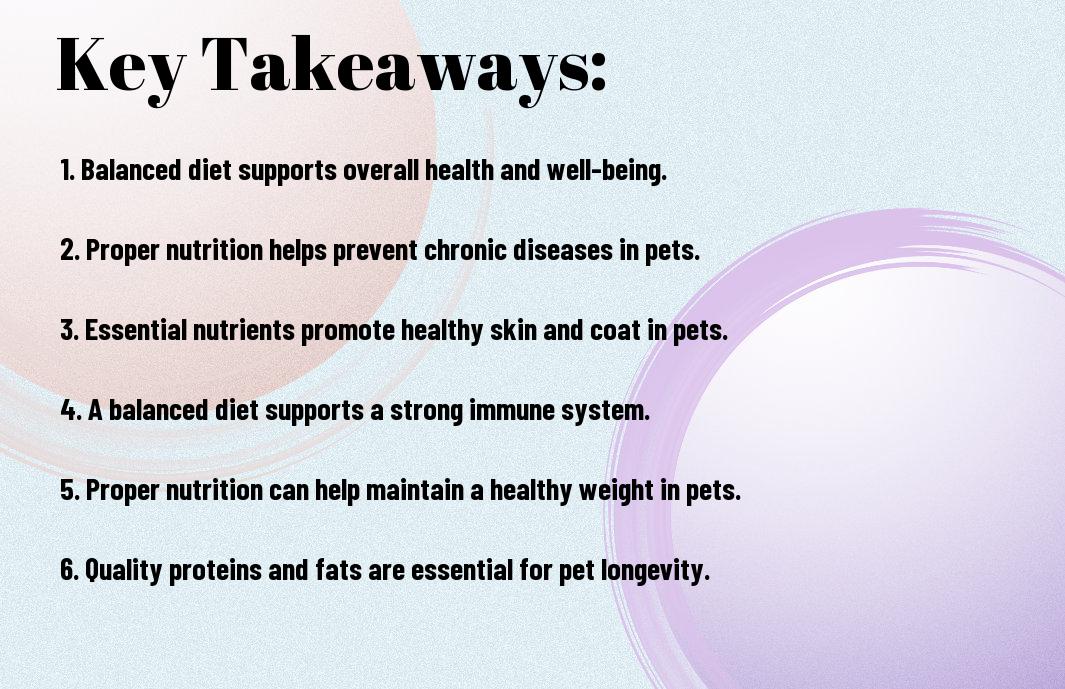Feeding your pet a well-rounded and balanced diet is paramount for their overall health and longevity. A balanced diet provides the essential nutrients, vitamins, and minerals needed to support their immune system, maintain a healthy weight, and prevent chronic diseases. As a responsible pet owner, it is crucial to understand the significance of proper nutrition and its direct impact on your pet’s longevity.
Many pet owners may not realize the vital role that nutrition plays in their pet’s overall health and wellbeing. Therefore, it is important to delve into the various reasons why feeding your pet a balanced diet is crucial for their longevity. In this blog post, we will discuss the key components of a balanced diet, the potential consequences of an imbalanced diet, and practical tips for ensuring that your pet receives the proper nutrition they need to thrive for years to come.
Key Takeaways:
- Proper nutrition is essential for your pet’s overall health and longevity.
- A balanced diet ensures that your pet receives all the necessary nutrients to support their immune system and prevent illnesses.
- Feeding your pet a variety of foods can help prevent nutritional deficiencies and promote optimal digestion.
- Consulting with a veterinarian can help you determine the specific dietary needs of your pet based on their breed, age, and activity level.
- Choosing high-quality pet food can provide the right balance of protein, carbohydrates, fats, vitamins, and minerals for your pet’s well-being.
- Regularly monitoring your pet’s weight and adjusting their diet as needed can help prevent obesity and related health issues.
- Providing your pet with a balanced diet can contribute to their overall happiness, energy levels, and vitality throughout their life.

Understanding Pet Nutrition
While it may seem straightforward, pet nutrition is a complex and essential part of caring for your animal companion. Understanding the specific dietary needs of your pet is crucial for their overall health and longevity.
Essential Nutrients for Pets
Essential nutrients, such as protein, fats, carbohydrates, vitamins, and minerals, are vital for your pet’s overall health. Protein is necessary for muscle development and repair, while fats provide energy and support cell function. Carbohydrates are an important energy source, and vitamins and minerals play a key role in metabolic processes and immune function.
Differences in Dietary Needs by Species and Breed
Nutrient requirements can vary significantly between different species and breeds of pets. For example, cats are obligate carnivores, meaning they require a diet high in animal-based protein. On the other hand, dogs are omnivores and can thrive on a more varied diet that includes both animal and plant-based ingredients. Additionally, certain breeds may have specific dietary needs based on their size, activity level, and genetic predispositions.
With this in mind, it is essential to consult with a veterinarian to determine the specific dietary needs of your pet based on their species, breed, age, and any underlying health conditions. A tailored nutrition plan can help ensure that your pet receives the necessary nutrients for optimal health and longevity.
Benefits of a Balanced Diet
Keep your pet healthy and thriving by ensuring they consume a balanced diet. Feeding your pet a variety of high-quality proteins, healthy fats, and essential nutrients is essential for their longevity. A well-balanced diet can help prevent certain health issues and promote overall well-being. For more information on the correlation between diet and longevity, check out Diet and Longevity.
Improved Overall Health
Overall health is significantly impacted by diet. A balanced diet provides all the necessary nutrients for proper bodily functions, which in turn promotes overall health. By consuming a variety of vitamins, minerals, and antioxidants, your pet can maintain a healthy weight, reduce the risk of chronic diseases, and support organ function.
Additionally, a balanced diet can improve digestion, increase energy levels, and promote healthy skin and coat, further contributing to your pet’s overall health and well-being.
Enhanced Immune Function
Benefits of a balanced diet extend to the immune system. Proper nutrition can strengthen the immune system, making your pet more resistant to various illnesses and infections. A diet rich in essential nutrients and antioxidants can help reduce inflammation, promote white blood cell production, and support the body’s defense mechanisms.
Diet plays a crucial role in enhancing immune function, and ensuring your pet’s diet includes key nutrients such as vitamin C, vitamin E, and omega-3 fatty acids is essential for maintaining a strong and resilient immune system.

Consequences of Nutritional Imbalances
After understanding the importance of a balanced diet for your pet, it’s crucial to also be aware of the consequences that can arise from nutritional imbalances. These imbalances can lead to a variety of health issues, both in the short-term and the long-term.
Short-Term Health Issues
Any sudden changes or deficiencies in your pet’s diet can lead to immediate health issues, such as gastrointestinal upset, diarrhea, vomiting, or lethargy. These symptoms can be distressing for both you and your pet, and may require veterinary intervention to correct. Additionally, a lack of key nutrients can weaken your pet’s immune system, making them more susceptible to illnesses and infections.
Long-Term Health Complications
Short-term nutritional imbalances can also have lasting effects on your pet’s health. Over time, deficiencies in essential nutrients can lead to long-term health complications, such as weakened bones and joints, poor dental health, skin and coat issues, and decreased organ function. These issues can significantly impact your pet’s overall quality of life and longevity.
Consequences of long-term nutritional imbalances can be serious and may include chronic illnesses, decreased lifespan, and reduced mobility. It’s crucial to be proactive in avoiding these long-term complications by ensuring your pet’s diet is balanced and meets their nutritional needs.
Factors Influencing Pet Diet
To ensure the longevity and well-being of your pet, it is essential to consider various factors that can influence their diet. These factors play a crucial role in determining the nutritional needs of your pet and can have a significant impact on their overall health and longevity. By understanding and addressing these factors, you can provide your pet with a balanced and nutritious diet that meets their specific needs.
- Life stage and nutritional requirements
- Weight management and control
- Health conditions and special dietary needs
- Activity level and energy requirements
Recognizing the importance of these factors can help you make informed decisions when it comes to your pet’s diet, ultimately contributing to their longevity and quality of life.
Life Stage and Nutritional Requirements
Any responsible pet owner should be aware that a pet’s nutritional needs vary depending on their life stage. Whether you have a growing puppy or kitten, an adult, or a senior pet, their nutritional requirements will differ. Puppies and kittens require a diet that supports their rapid growth and development, while adult pets need a balanced diet to maintain their overall health. Senior pets may have specific dietary needs to support their aging bodies and medical conditions.
Weight Management and Control
On the other hand, weight management and control play a critical role in determining the longevity and well-being of your pet. Just like humans, pets can suffer from obesity and its associated health issues. It’s essential to monitor your pet’s weight and provide them with an appropriate diet to help them maintain a healthy body condition. Obesity can lead to various health problems, including diabetes, arthritis, and heart disease, significantly impacting your pet’s longevity and quality of life.
Diet plays a crucial role in weight management and control, and by providing your pet with a balanced and portion-controlled diet, you can help them maintain a healthy weight and reduce the risk of obesity-related health issues. It is essential to choose a diet that is tailored to your pet’s specific needs, taking into account factors such as their age, activity level, and overall health condition.

Creating a Balanced Diet Plan
For pet parents, ensuring that their furry companions are receiving a balanced diet is paramount to their overall health and longevity. A well-rounded nutritional plan is essential in providing the necessary nutrients for your pet to thrive. If you’re wondering why a good diet is important for your pet, you can learn more here.
Working with Veterinary Nutritionists
Veterinary nutritionists are specialized professionals who can help in formulating a personalized diet plan for your pet based on their specific needs and health concerns. By working with a veterinary nutritionist, you can ensure that your pet is getting the right balance of nutrients to support their overall well-being and longevity.
Reading and Understanding Pet Food Labels
To make informed decisions about your pet’s diet, it’s essential to understand how to read and interpret pet food labels. This includes knowing how to identify key ingredients, understand nutritional values, and recognize any potential allergens or additives that may be present in the food.
Food labels provide crucial information about the ingredients, nutritional content, and quality of the pet food. Understanding how to decipher these labels will empower you to make the best choices for your pet’s dietary needs.
Supplements and Special Diets
Unlike humans, pets may require supplements or special diets to maintain a balanced and nutritious diet. These supplements and special diets play a crucial role in ensuring your pet’s overall health and longevity. Whether it’s addressing specific health conditions or providing additional nutrients, understanding when supplements are necessary and how to navigate prescription diets and allergies is essential for pet owners.
When Supplements are Necessary
Diets that are lacking in certain nutrients or that need additional support for specific health conditions may require the use of supplements. For example, if your pet is on a vegetarian or homemade diet, they may require supplementation to ensure they are receiving essential vitamins and minerals that may be lacking in the base diet. Additionally, older pets or those with certain health conditions may benefit from supplements to support their overall health and well-being.
Navigating Prescription Diets and Allergies
On the other hand, navigating prescription diets and allergies can be a complex task for pet owners. Prescription diets are specially formulated to address specific health concerns, such as kidney disease, diabetes, or food allergies. It’s crucial for pet owners to work closely with their veterinarian to determine the best course of action when it comes to managing prescription diets and allergies, as these diets can have a significant impact on your pet’s overall health and well-being.
For instance, if your pet has been diagnosed with a food allergy, it may be necessary to switch to a hypoallergenic prescription diet to alleviate symptoms and improve their quality of life. Understanding how to navigate and implement these dietary changes is essential for the long-term health and longevity of your pet.
Monitoring and Adjusting Your Pet’s Diet
Now that you understand the importance of feeding your pet a balanced diet, it’s crucial to monitor and adjust their diet as needed to ensure their long-term health and longevity. This involves routine health check-ups and evaluations of their diet, as well as being attuned to any signs of nutritional deficiencies or excesses.
Routine Health Check-ups and Diet Evaluation
Adjusting your pet’s diet should be an ongoing process that starts with regular veterinary check-ups. During these check-ups, your veterinarian can evaluate your pet’s overall health and make recommendations for their diet based on their individual needs. It’s important to discuss any changes in your pet’s behavior, weight, or appetite, as these can be indicators of potential nutritional imbalances. By staying proactive in these evaluations, you can ensure that your pet’s diet is consistently meeting their dietary requirements.
Signs of Nutritional Deficiencies or Excesses
Any changes in your pet’s physical appearance, such as a dull coat, excessive shedding, or weight loss, can be signs of nutritional deficiencies. On the other hand, excessive weight gain, lethargy, or digestive issues may indicate an excess of certain nutrients in their diet. It’s important to monitor these signs closely and make adjustments to their diet as needed to prevent long-term health issues.
Nutritional imbalances can lead to a range of health issues for your pet, including but not limited to obesity, dental problems, and digestive disorders. By staying vigilant and observing any changes in your pet’s health or behavior, you can address potential nutritional deficiencies or excesses proactively.

Upon reflecting on the importance of a balanced diet for pets
It is evident that providing a balanced diet for our pets is crucial for their longevity and overall well-being. Just as humans require a nutritious and varied diet to thrive, so do our furry companions. A diet that is well-balanced and tailored to your pet’s specific needs can help prevent a host of health issues, including obesity, heart disease, and diabetes. Additionally, a balanced diet can support your pet’s immune system and help them maintain a healthy weight, which can ultimately lead to a longer and happier life.
Ultimately, feeding your pet a balanced diet is one of the most important responsibilities of a pet owner. By taking the time to research and choose the right foods for your pet, you are making an investment in their long-term health and well-being. While it may be tempting to indulge your pet with table scraps or treats, it is crucial to remember that a balanced diet is key to ensuring a happy and healthy life for your beloved pet.
FAQ
Q: Why is feeding your pet a balanced diet crucial for longevity?
A: Feeding your pet a balanced diet is crucial for longevity because it provides essential nutrients to support their overall health, immune system, and energy levels, helping to prevent disease and promote a longer, healthier life.
Q: What are the key components of a balanced diet for pets?
A: A balanced diet for pets should include the right balance of protein, carbohydrates, fats, vitamins, and minerals to meet their specific nutritional needs. It should also provide adequate hydration through fresh water and preferably high-quality protein sources.
Q: How does a balanced diet impact a pet’s overall health and well-being?
A: A balanced diet directly impacts a pet’s overall health and well-being by supporting their digestive system, maintaining a healthy weight, promoting a shiny coat and healthy skin, and improving their immune system, which can help prevent common health issues.
Q: What are the consequences of not feeding your pet a balanced diet?
A: Not feeding your pet a balanced diet can lead to a range of health issues such as obesity, malnutrition, digestive problems, dental issues, and a weakened immune system, which can increase their risk of developing illnesses and reduce their lifespan.
Q: How can pet owners ensure their pets are receiving a balanced diet?
A: Pet owners can ensure their pets are receiving a balanced diet by selecting high-quality commercial pet foods that are formulated to meet their specific nutritional needs, along with occasional supplementation, and providing fresh, clean water at all times.
Q: Are there specific dietary requirements for different types of pets?
A: Yes, different types of pets have specific dietary requirements based on their species, breed, age, activity level, and any underlying health conditions. It’s important to consult with a veterinarian to develop a tailored feeding plan for each individual pet.
Q: What role does exercise play in conjunction with a balanced diet for pet longevity?
A: Exercise plays a vital role in conjunction with a balanced diet for pet longevity by helping to maintain a healthy weight, improve cardiovascular health, strengthen muscles, and stimulate mental and physical well-being, which all contribute to a longer, healthier life for pets.










